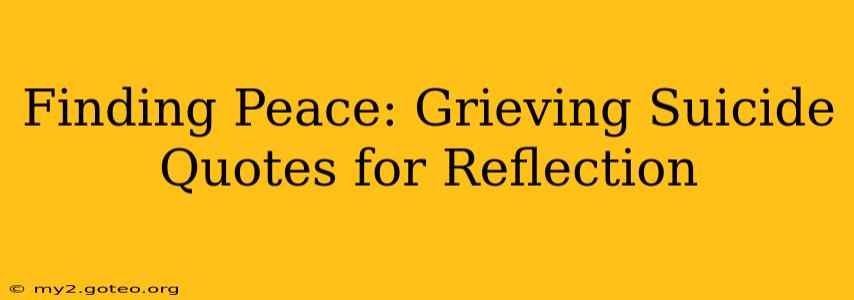The death of a loved one by suicide leaves an immeasurable void, a wound that cuts deep into the heart. Navigating grief after such a loss is a unique and agonizing journey, filled with questions, anger, guilt, and profound sadness. Finding solace and peace amidst this turmoil can feel impossible, but it's crucial to remember that healing is possible, even if the path is long and winding. This article offers a space for reflection, exploring the complexities of grieving suicide and offering comforting words from those who have walked a similar path. We'll also address some frequently asked questions surrounding grief and suicide.
While quotes can't erase the pain, they can offer a sense of connection and understanding, reminding us that we're not alone in our suffering. They can provide a flicker of hope during the darkest hours and serve as a gentle hand to guide us through the process of healing.
Understanding the Unique Pain of Suicide Grief
Suicide leaves behind a constellation of unique challenges. Unlike other forms of death, suicide often brings feelings of:
- Confusion and Unresolved Issues: The suddenness and unexpected nature of suicide often leave survivors with many unanswered questions and a sense of unfinished business.
- Intense Guilt and Self-Blame: Survivors may grapple with thoughts of "What if?" and "Could I have done something differently?", leading to overwhelming guilt and self-blame, even if there was nothing they could have done.
- Stigma and Shame: The stigma surrounding suicide can make it difficult for survivors to openly grieve and seek support. They may feel shame or embarrassment, further isolating them in their pain.
- Anger and Betrayal: Feelings of anger and betrayal are common, directed at the deceased, themselves, or others. This anger is a natural part of the grieving process, even though it can be incredibly painful.
Grief After Suicide: Frequently Asked Questions
Many people struggling with the loss of a loved one to suicide have similar questions and concerns. Here are some common ones and their answers:
What are the stages of grief after suicide?
There isn't a linear or predictable progression of grief. Everyone experiences grief differently, and the stages (denial, anger, bargaining, depression, acceptance) are not always sequential or experienced in the same way. It's a complex and individualized process.
How long does it take to grieve the suicide of a loved one?
There's no timetable for grief. It's a deeply personal experience with no set duration. Some find solace sooner, while others may experience prolonged grief. Be patient with yourself and allow yourself the time you need to heal.
Is it normal to feel angry after a suicide?
Yes, anger is a common and valid emotion after a suicide. It's a natural response to the loss and the circumstances surrounding it. Allow yourself to feel the anger without judgment.
How can I cope with guilt and self-blame after a suicide?
Challenging these feelings is crucial. Seek professional help from a therapist or grief counselor. They can provide tools and strategies to help you process these difficult emotions and understand that you are not responsible for another person's actions.
Finding Solace: Quotes for Reflection
These quotes, from various sources, offer a glimpse into the experience of grieving suicide and may resonate with your own feelings:
-
"What is grief, if not love persevering?" - Unknown. This quote reminds us that grief is a testament to the love we shared with the deceased.
-
"The pain of losing someone you love is a burden too heavy to bear alone." – Unknown. This underscores the importance of seeking support during this difficult time.
-
"Grief is the price we pay for love." – Queen Elizabeth II. This acknowledges the inherent link between love and loss, highlighting the unavoidable pain of losing someone cherished.
-
"It's okay to not be okay." - Unknown. This simple yet powerful statement validates the legitimacy of your feelings. It’s essential to acknowledge and accept your emotions without judgment.
Seeking Support and Healing
Navigating the grief after a suicide is an incredibly challenging journey. Remember that you are not alone. Seeking professional help from therapists, grief counselors, or support groups specializing in suicide loss is crucial. These resources can provide a safe space to process your emotions, develop coping strategies, and connect with others who understand your pain. There are also many online resources and support groups available, offering valuable community and understanding.
The path to healing is a long one, but with support, self-compassion, and the courage to confront your grief, you can find peace and learn to live with the memories of your loved one. Remember that healing is a process, not a destination. Be kind to yourself, and allow yourself the time and space needed to grieve.

